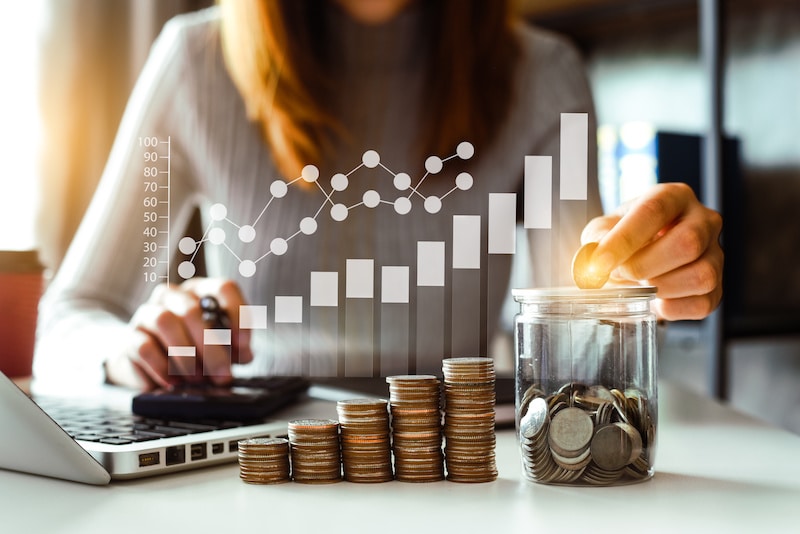Your go-to source for news on investments is The DI Wire. Since its founding in 2013, it has aided numerous individuals looking to explore the finance and investment fields.
Since the start of COVID-19 and the conflict between Russia and Ukraine, many countries worldwide have been experiencing high inflation. The DI Wire will walk you through understanding inflation, its causes, and potential investment opportunities in these trying times.
What is Inflation?
The deliberate rise in the cost of goods and services is known as inflation. Inflation can affect almost any good or service, including necessities like housing, food, healthcare, and utilities. Each unit of currency purchases fewer goods and services as the general price level rises, decreasing the purchasing power of money. Hyperinflation happens if the situation is not controlled.
Causes of inflation
The increase in the money available is among the significant causes of inflation. The government occasionally prints more money in response to pandemics like COVID-19. The currency then loses value as a result.
Understanding the three inflation types is necessary to know for investing purposes.
- Demand-pull inflation
This type of inflation happens when the amount of money in circulation increases, causing a demand for goods and services that may exceed an economy’s ability to supply.
It is evident if consumers have extra money, they will want to spend it. Since suppliers want to make profits, they won’t hesitate to sell goods to the consumers, and when goods and services are limited, the cost rises.
The US is currently experiencing a supply chain issue. Job seekers are becoming more selective about job responsibilities as a result of benefits granted to the unemployed. As a result, prices and wages are rising.
- Cost-push inflation
This inflation is brought by an increase in the price of labor costs and particular raw materials for specific goods. As a result of the high cost of production, the consumer will pay more for goods and services.
The demand for goods does not change, but the supply decrease due to higher production costs. Prices for goods and services frequently impacted by this kind of inflation include oil and natural gas.
- Built-in Inflation
The built-in rate of inflation is based on expectations for future inflation rates. The employees expect their pay to increase at the same rate as the increase in goods and service costs.
As a result of this kind of inflation, people start saving money to avoid buying supplies. This makes the supplies scarce, leading to price increases. Inflation will then make the saving of money useless.
The Stock Market and Inflation
Most people are unsure of where to begin when making investments in stocks. A stock is a type of security that grants an investor a portion of a company’s ownership.
You can opt to buy a small amount of stock or a number of them. The quantity of stocks you purchase is referred to as shares. An increase in the stock price increases the value of your share.
Value stocks perform better during periods of high inflation, while growth stocks perform better when inflation is low. The stock market is a massive network of economic exchanges where buyers and sellers exchange stocks. The market will have all the information you require regarding the companies selling stocks and price setting.
Investing During Inflation
It is common to experience hesitancy while making investments during an inflationary environment. You must abide by these basic guidelines for successful investments.
- Setting goals
You should have specific objectives before making an investment in any business. You should consider your motivations for purchasing stocks. Knowing your objectives will help you decide what kinds of stocks to buy and what time frame you should expect returns.
- Research on admirable businesses
Since stocks are the best investment, don’t just buy stocks in any company. Ensure your chosen company can raise product prices as raw material and supply costs rise.
Food and oil companies are among the best to invest in. If you are unsure of the company, you should seek advice from financial experts.
To carry variations, you should have a variety of companies at your disposal. After settling on a particular company, do more profound research on it. You must know crucial details like management and the business’s revenue stream.
- Wait in cash
After researching the various businesses, you can invest in, keep an eye out for buying opportunities. To prevent missing the opportunity, make sure you have cash ready.
- Buy stocks on sale
Although the return on investment in stocks cannot be guaranteed, purchasing them during a sale will increase the chances.
Great stocks rarely go on sale, but when they do, they offer the chance to purchase businesses with high intrinsic value for up to 50% off. This means you can buy the stocks low and sell them at a higher price.
The best time to buy stocks is when major players begin to sell off because the overvalued market will then be at a low price.
Summary
Stock investing requires endurance and a high level of risk tolerance. Be sure to consult with financial advisors and thoroughly research the company you intend to put money into before buying any stocks. Businesses with superior management and funding sources provide better security for your investment. The DI Wire comes in handy if you need insights into such matters.

